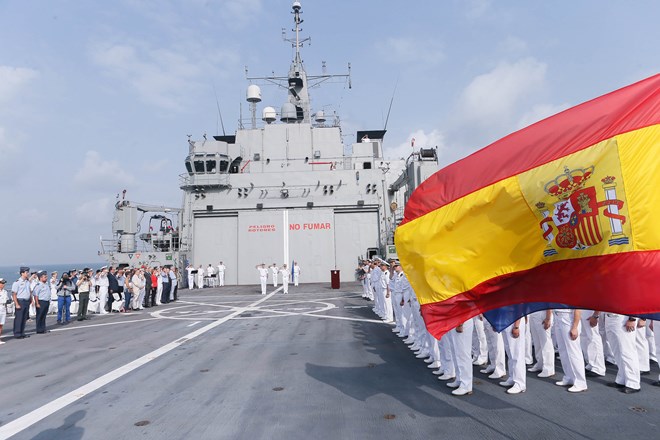Spain assumes command of EU anti-piracy mission off Somali coast

Over the years, Operation Atalanta has played a significant role in improving maritime safety in the region.
Spain has officially assumed leadership of the European Union’s naval operation “Atalanta,” an initiative established to combat piracy and protect maritime routes off the coast of Somalia.
The announcement was made on Saturday, reinforcing Spain’s involvement in supporting regional maritime security efforts in the Horn of Africa.
More To Read
- Tanzania dispatches envoy to Brussels to avert Sh23.3 billion EU aid freeze
- Mogadishu police, intelligence agents crack down on armed groups after surge in street crime
- Somalia declares drought emergency as millions face hunger after failed rains
- International Rescue Committee warns millions at risk as drought intensifies across Northern Somalia
- Somali Region frees ‘121 unlawfully detained’ people, ‘pardons’ two jailed journalists, Rights Commission says
- Tanzania challenges EU debate on Tundu Lissu and post-election crisis
The European Union launched Operation Atalanta in 2008 in response to increasing pirate attacks in the Gulf of Aden and the wider western Indian Ocean. The mission was tasked with protecting vessels delivering humanitarian aid, such as those of the World Food Programme, and ensuring the safe passage of commercial ships navigating through this high-risk maritime region.
Spain takes over the mission from Italy, with Spanish Admiral Francisco Javier Vázquez Sanz now in command.
The formal handover took place in a ceremony aboard the Italian frigate “Rizzo,” currently docked at the main port in Djibouti.
Admiral Vázquez Sanz replaces Italian Admiral Davide Da Pozzo, who had been leading the operation.
Over the years, Operation Atalanta has played a significant role in improving maritime safety in the region.
Since its establishment, the mission has contributed to a sharp reduction in piracy-related incidents, allowing the uninterrupted movement of international trade vessels.
The operation continues to be part of a broader international strategy to ensure freedom of navigation in waters that remain vulnerable to security threats.
The European Union’s naval mission in the region involves contributions from several member states, including naval vessels, aircraft, and personnel. With Spain now leading the operation, the country demonstrates its commitment to maintaining and enhancing cooperation on maritime security at the international level.
By taking over the command, Spain will be responsible for directing joint naval operations, intelligence sharing, surveillance, and the coordination of assets from participating nations.
The mission remains focused on deterring piracy and armed robbery at sea, monitoring fishing activities, and supporting regional maritime capacity-building efforts.
Spain’s leadership also comes at a time when international interest in maritime security along the Red Sea and Indian Ocean remains high, due to the strategic importance of these routes for global trade. The area is a key passage for cargo ships moving between Europe, the Middle East, and Asia.
Top Stories Today














































